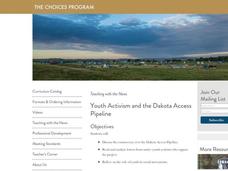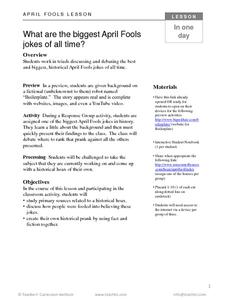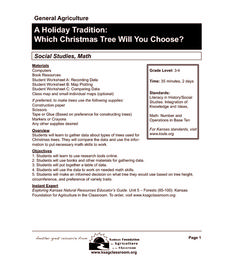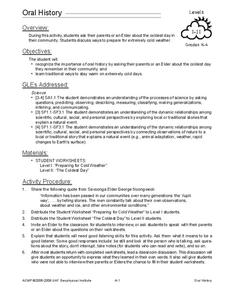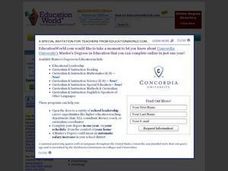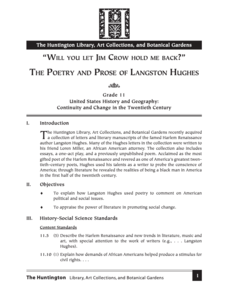Stanford University
Ruby Bridges
A two-part lesson features Civil Rights hero, Ruby Bridges. Part one focuses on the heroic actions of Ruby Bridges then challenges scholars to complete a Venn diagram in order to compare themselves to her. Part two begins with a...
Brown University
Youth Activism and the Dakota Access Pipeline
Do young people have a role in social movements? Should they? The involvement of young people in the Dakota Access Pipeline is the focus of a resource that asks class members to examine letters written by native youths who oppose the...
TCI
What Are the Biggest April Fools Jokes of All Time?
After working in groups to analyze primary sources related to a historical hoax, learners will discuss how people managed to be fooled and work to identify one of the biggest April Fools jokes in history.
Constitutional Rights Foundation
Why Don’t More People in the U.S. Vote?
To vote or not to vote, that is the question. Secondary scholars explore voter turnout in the United States. The resource uses informational text, group discussion, and a worksheet to help academics understand hindrances to voting and...
Curated OER
Social Class, Social Change, and Poverty
Students begin to explore poverty and its implications on society and future generations. They should have had experience with identifying social change that happens gradually and social change that happens quickly because of natural...
Agriculture in the Classroom
A Holiday Tradition: Which Christmas Tree Will You Choose?
Different varieties of Christmas trees provide an interesting way to combine social studies, science, math, and technology. Class members not only research the history of the Christmas tree holiday tradition, they compare and contrast...
Curated OER
Disease & Epidemics: Architects of History
Students explore disease and its relationship to history and literature. They investigate issues that range from early biological warfare and historical disease treatments, to observing today's race for the cure against current emerging...
Minnesota Department of Natural Resoures
Minnesota’s Forests
The forests of Minnesota provide middle schoolers with an integrated learning opportunity. They examine the three biomes and their histories, conduct experiments, read stories, and draw pictures. A lovely lesson about trees.
Curated OER
Oral History
Students interview a Native Elder to learn about oral history and cold weather. In this weather activity, students ask an Elder about the coldest day they remember in their community and complete two worksheets for the topic.
Curated OER
Working in Photographs
Students analyze illustrations of workers in the 19th and 20th centuries. For this social science lesson, students examine photographs of workers and identify the types of work that were available in the 19th century compared to the 20th...
Curated OER
Flood Control: Environmental History
High schoolers examine the painting, Spring on the Missouri. They role-play and discuss floods and flood control from the views of an environmental lobbyist and a farmer.
Constitutional Rights Foundation
Guest-Worker Program
The U.S. Guest-Worker Program and the H-2A visa are the focus of a social studies activity. First, class members assume the role of advisors who must present the president with four proposals that would amend the visas given to...
Museum of Tolerance
Developing Media Literacy
To protect young people from questionable content, many schools limit access. This resource suggests that because learners can so readily avail themselves to unrestricted Internet access, it is vital for 21st century learners to develop...
Curated OER
Breaking the Chains, Rising Out of Circumstances
Discuss the history of slavery by analyzing historic photography depicting slavery. Learners write fictional stories based on these photographs. This is a creative and motivating way to launch a discussion of these topics.
Channel Islands Film
Magic Isle: Lesson Plan 1
What are the factors that limit growth and expansion? As part of their study of Catalina Island, class members view the West of the West's documentary Magic Isle and research William Wrigley and the Santa Catalina Island Company. After...
Indian Land Tenure Foundation
A Leadership Chart
It's important for children to understand how they fit into their local or social community. They discuss leadership and who exemplifies a leader in their family, community, and school. Each child will create a quilt square by...
iCivics
Step One: We've Got Issues
What is the most pressing issue in your community? The resource helps you and your middle schoolers begin the process of doing something about it! Learners compare and contrast two pressing issues in their local counties by reading two...
Curated OER
Changing Planet: Infectious Diseases Classroom Activity
Here is a different approach: emerging epidemiologists first go home to interview family on the topic of infectious disease. Then they come to class and view a video and PowerPoint that explore how climate change may increase the...
Curated OER
How Tolerant Are Kids in Your School?
Learners graph results of a survey about attitudes and tolerance in their school. They discuss the social climate of their school. Students complete a questionnaire, and tabulate the raw data from their class. They create a bar graph...
Benjamin Franklin Tercentenary
Ingenious: Franklin Assembles a Scientific Community
Few Americans have heard of the burgeoning scientific community known as the America Philosophical society, started by none other than Benjamin Franklin. With inquiry, research, and discussion, high schoolers come to understand their...
National Woman's History Museum
Hedy Lamarr, An Inventive Mind
Hedy Lamarr led a double life. Best known as an actress, Lamarr was also a brilliant inventor, responsible for the technology found in Wi-Fi, GPS, and Bluetooth. After studying primary and secondary source materials, groups conduct an...
Peace Corps
Celebrating Our Connections Through Water
Water is vital for survival, but how does it help global cultures flourish? Elementary and middle schoolers learn about the different cultures around the world that celebrate water and incorporate it into their festivals or traditions.
Curated OER
Conflict Resolution in the World Today: Introduction to Current World conflicts, their Antecendents, the Progression, and their Potential Conclusions
Students write a paragraph describing a conflict they had with a friend or a family member and a paragraph explaining how it was resolved. In this social science lesson, students share their paragraphs with a partner and then will...
Huntington Library
The Poetry and Prose of Langston Hughes
Eleventh graders discover the poetry of Langston Hughes. In this social issues lesson plan, 11th graders experience the views of Langston Hughes. Students read Hughes' poetry and discuss the basic theme. Students evaluate the political,...



